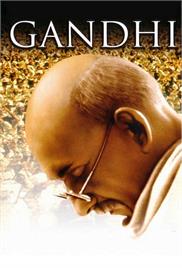Be Careful of Fake Websites. Always use HindiMovies.to domain & Join our Telegram Channel for Latest Updates.

Likes: 4
Views: 3.58K
In 1893, Gandhi is thrown off a South African train for being an Indian and traveling in a first class compartment. Gandhi realizes that the laws are biased against Indians and decides to start a non-violent protest campaign for the rights of all Indians in South Africa. After numerous arrests and the unwanted attention of the world, the government finally relents by recognizing rights for Indians, though not for the native blacks of South Africa. After this victory, Gandhi is invited back to India, where he is now considered something of a national hero. He is urged to take up the fight for India’s independence from the British Empire. Gandhi agrees, and mounts a non-violent non-cooperation campaign of unprecedented scale, coordinating millions of Indians nationwide. There are some setbacks, such as violence against the protesters and Gandhi’s occasional imprisonment. Nevertheless, the campaign generates great attention, and Britain faces intense public pressure. Too weak from World War II to continue enforcing its will in India, Britain finally grants India’s independence. Indians celebrate this victory, but their troubles are far from over. Religious tensions between Hindus and Muslims erupt into nation-wide violence. Gandhi declares a hunger strike, saying he will not eat until the fighting stops. The fighting does stop eventually, but the country is divided. It is decided that the northwest area of India, and eastern part of India (current day Bangladesh), both places where Muslims are in the majority, will become a new country called Pakistan (West and East Pakistan respectively). It is hoped that by encouraging the Muslims to live in a separate country, violence will abate. Gandhi is opposed to the idea, and is even willing to allow Muhammad Ali Jinnah to become the first prime minister of India, but the Partition of India is carried out nevertheless. Gandhi spends his last days trying to bring about peace between both nations. He thereby angers many dissidents on both sides, one of whom finally gets close enough to assassinate him.
Duration: 191 min
Released: 1983
IMDb Rating: 8.1/10 (134,918 Votes)
Genre: Biography, Drama, Hindi Movies, History
Stars: Edward Fox, Ben Kingsley, Candice Bergen, John Gielgud
Directors: Richard Attenborough
Writers: John Briley
Year: 1982
Server 1 – Youtube
Server 2 – Youtube
Server 3 – Nowvideo
Gandhi (1982): A Cinematic Tribute to a Global Icon
"Gandhi" is a seminal biographical drama film directed by Richard Attenborough, released in 1982. This monumental film captures the profound life and legacy of Mohandas Karamchand Gandhi, affectionately known as Mahatma Gandhi, the leader of India’s non-violent independence movement against British rule. The movie is not only a rich historical recount but an emotional saga that delineates the philosophy and struggles of one of history's greatest peaceful warriors.
Plot Synopsis
The film traces Gandhi's journey from a shy, young lawyer in South Africa, where he first experiences racial discrimination, to becoming the spearhead of India’s fight for independence. It portrays key events such as his experiments with non-violence (Satyagraha), the Salt March, and the Quit India Movement. The narrative delicately balances the personal and political upheavals faced by Gandhi, his inspiration to millions, and his ultimate assassination in 1948. The film conveys the essence of Gandhi's ideology: non-violence, civil disobedience, and the moral power of peaceful resistance.
Main Cast and Crew
Historical and Cinematic Importance
"Gandhi" is notable for its meticulous attention to historical accuracy and authenticity. The production filmed in India and involved thousands of extras to recreate the era’s environments authentically. The film stands out as a bridge between Hollywood and Indian cinema, introducing international audiences to the cultural and political independence struggle of India.
Its success is reflected not just in box office numbers but in its critical reception. "Gandhi" won eight Academy Awards including Best Picture, Best Director, and Best Actor. It remains an educational tool and a cinematic milestone for biographical storytelling.
Although primarily in English, the movie incorporates Hindi and other Indian languages to maintain authenticity. It does not categorize under typical Bollywood musical traditions, so there is less focus on song and dance sequences typical of Indian cinema but rather focuses on a dramatic and respectful narrative style.
Conclusion
In summary, "Gandhi" (1982) is an inspiring and enlightening film that provides an in-depth look at one of the 20th century's most influential leaders. The compelling performances, especially by Ben Kingsley, combined with Richard Attenborough’s visionary direction, offer audiences an unforgettable cinematic experience. It's a must-watch for anyone interested in history, politics, and the power of peaceful resistance to effect profound social change.